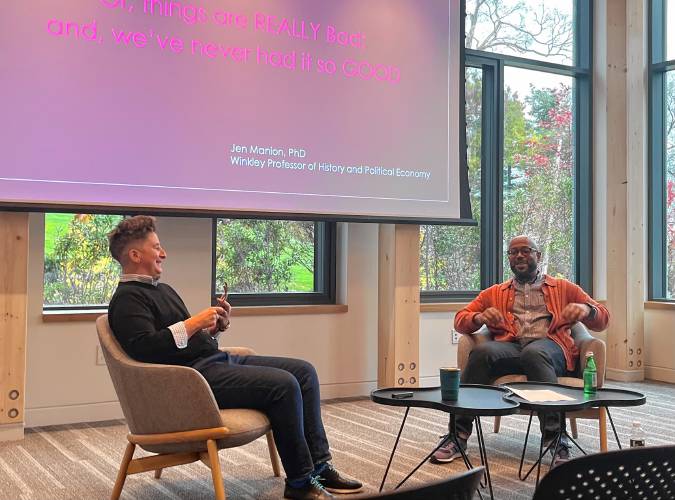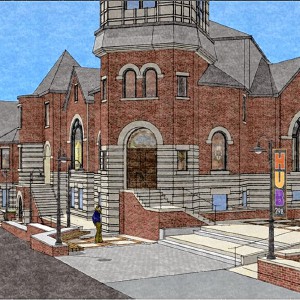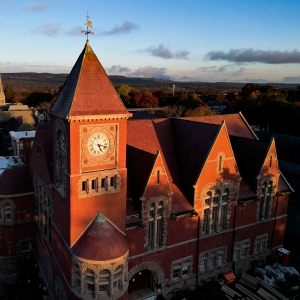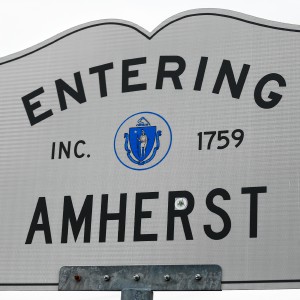Putting anti-trans rights backlash in context: Profs see opposition as political lightning rod

Professor Jen Manion (left) and Professor Khary Polk (right) discuss anti-LGBTQ sentiment and legislation at an Amherst College discussion. staff photo / Maddie Fabian
| Published: 10-29-2023 1:04 PM |
AMHERST — Why is it that the number of bills around the nation targeting the LGBTQ community has increased so much over the last few years? And what role does history play in that increase?
That’s what Professor Jen Manion and Professor Khary Polk discussed last week at the Amherst College Center for Humanistic Inquiry (CHI), during a talk titled “Reflections on Anti-LGBTQ+ Bills and Propagranda in the U.S.”
“As someone who’s lived in this body, in this life, in this movement, in this community since I was about 19 — which is 30 years ago — so much has changed tremendously for the better,” said Manion, an Amherst College professor of history and sexuality, women’s and gender studies. “And yet, everything that’s happening right now is so bad and so gross, so extreme and so mean-spirited and so ignorant.”
The American Civil Liberties Union has identified 501 proposed, passed and defeated anti-LGBTQ bills in the United States just this year. That compares to 278 bills last year, and over 100 in 2021.
Even Massachusetts, a blue state that generally supports LGBTQ rights, had a ballot initiative in 2018 seeking to remove gender identity and expression from the state’s non-discrimination clause. The initiative was overwhelmingly defeated, but was a testament to a right-wing effort targeting the queer community.
Manion began the presentation by listing landmark Supreme Court cases starting from 2003 that decriminalized sodomy, protected gay and lesbian military members, recognized same-sex marriages, made it illegal to discriminate against trans people in medicine, and more.
What came after those legal protections, Manion said, was the “transgender tipping point,” or put differently, “tremendous visibility of trans people.”
“You sort of have this moment where most people are encountering and thinking about trans people, trans issues, trans visibility, and it’s unavoidable. So what happens next is this tremendous conservative backlash,” Manion said.
Article continues after...
Yesterday's Most Read Articles
 More than 130 arrested at pro-Palestinian protest at UMass
More than 130 arrested at pro-Palestinian protest at UMass
 Public gets a look at progress on Northampton Resilience Hub
Public gets a look at progress on Northampton Resilience Hub
 Northampton bans auto dealerships near downtown; zone change won’t affect Volvo operation on King Street
Northampton bans auto dealerships near downtown; zone change won’t affect Volvo operation on King Street
 UMass basketball: Bryant forward Daniel Rivera to be Minutemen’s first transfer of the offseason
UMass basketball: Bryant forward Daniel Rivera to be Minutemen’s first transfer of the offseason
 Town manager’s plan shorts Amherst Regional Schools’ budget
Town manager’s plan shorts Amherst Regional Schools’ budget
 Police respond to alcohol-fueled incidents in Amherst
Police respond to alcohol-fueled incidents in Amherst
“Gay people had been such a safe punching bag, and such an easy way to mobilize the Republican base for so long, that when popular American opinion on gay marriage, same-sex marriage was settled … Now who are they going to turn to?”
The answer, Manion said, is trans youth, specifically around gender-affirming medical care and sports.
“The fact that these two issues are in the news and there’s all these bills about them, it’s not that there was so much harm or controversy or trouble being caused,” said Manion. “It was a very explicit, well-funded, well-researched orchestrated strategy.”
In 2022, out of the 20 laws targeting LGBTQ people that passed, 17 aimed to restrict the rights of transgender student athletes, according to the ACLU.
“Historically, kids have always been the thing that stops us,” said Polk, an Amherst College professor of Black studies and sexuality, women’s and gender studies.
Polk pointed to a map produced by the UCLA School of Law Critical Race Studies program that displays 750 anti-critical race theory measures that have been introduced at local, state and federal levels since 2020.
“I think it’s useful to think about these two bans together,” Polk said, referring to CRT bans and anti-LGBTQ bans.
“First, doing so allows us to think in an intersectional fashion about who and how these bans aim to oppress,” said Polk. “Second … they both seem to overlap in some areas, but especially within the area of education.”
“And third, I would argue that part of the intended impact of these bans is to silence the histories, as well as the voices, of those who have been and continue to be marginalized,” Polk said.
Despite all the anti-LGBTQ and specifically anti-trans discourse and legislation, a 2022 Pew Research Center study found that a majority of U.S. adults, at 64%, are in favor of basic trans rights.
“We’ve been doing this before there were laws against us, before there were laws for us,” said Manion. “The laws change; the attitude of doctors changes; we have friends; we have enemies; there’s just this tremendous historic record of trans resistance and persistence.”
Just a few days ago, Polk pointed out, a National Basketball Association referee came out as non-binary.
“It’s small, but just the idea of … the announcers having to actually acknowledge this ref as non-binary … That itself is a moment in which there’s something that will shift, and that is a language that folks will begin to learn.”
“I think that is one of the things that I continue to feel hopeful about is that folks are not trying to go back,” Polk said.
The Amherst College event, attended by around 40 students and professors, was held in the new Think Tank housed in the newly constructed AlikiPerrotti and Seth Frank Lyceum.
Maddie Fabian can be reached at mfabian@gazettenet.com.

 State Senate budget funds free community college for all
State Senate budget funds free community college for all ‘We can just be who we are’: Thousands show support for LGBTQ community at Hampshire Pride
‘We can just be who we are’: Thousands show support for LGBTQ community at Hampshire Pride Doors open at Tilton Library’s temporary home at South Deerfield Congregational Church
Doors open at Tilton Library’s temporary home at South Deerfield Congregational Church Area property deed transfers, May 2
Area property deed transfers, May 2
